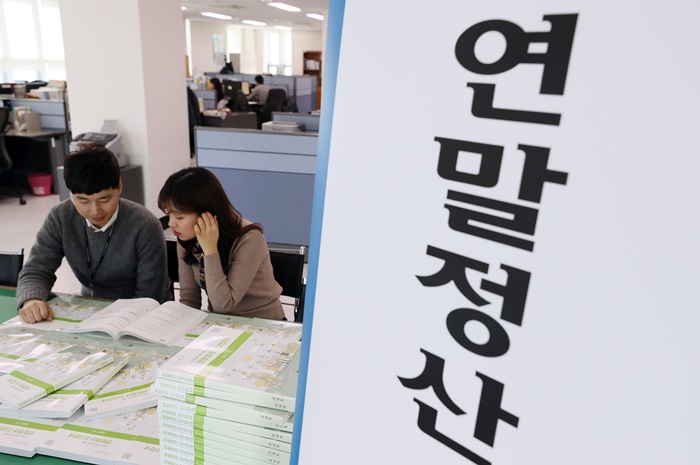
The year-end tax settlement season for non-Korean workers is near at hand. (Yonhap News)
By Kim Eun-young and Kim Young Shin
The season of year-end tax settlements is near, during which non-Korean workers in Korea have the chance to earn a bonus "13th month pay check" in the year.
According to the National Tax Service, 563,000 non-Korean workers in Korea have their tax deducted through a year-end tax settlement in 2017. The number has been increasing year-to-year. Here are some questions and answers to show what non-Korean workers need to know about the year-end tax settlement.
1. Who qualifies for a year-end tax settlement and which items get a tax deduction?
Anyone who has earned income from labor in Korea qualifies for a year-end tax settlement, regardless of nationality, their length of stay in Korea or their income.
However, depending on the length of stay, the items for tax deduction differ. Any non-Korean workers that have stayed in Korea longer than 183 days (about half a year) can get a tax deduction on the same items as Korean workers, except for housing costs, house-purchasing savings and tax credits on monthly rents.
Those who have stayed in Korea less than 183 days can only get a tax deduction on some items, including basic deductions and pension contributions. Special deductions, such as medical or educational fees, do not apply to this group.
2. Are there any special taxation benefits for non-Korean employees?
There are. Non-Korean workers, for the first five years from their first day of work, can choose to pay 19 percent of their salary as tax instead of the amount calculated by the basic tax rate. Those who provide technology in Korea under a licensing agreement for engineering technology, or non-Korean researchers at government-funded research institutes, get a 50 percent tax exemption from income tax for two years. Non-Korean teachers and professors from Korea’s tax treaty partner nations, such as the U.S. or Australia, are exempt from paying tax regarding their income from lectures or conducting research.
3. How can non-Korean employees get the proper tax deductions applied?
If a non-Korean worker belongs to a company, the documentary evidence for tax deductions should be submitted to the employer between Jan. 20 and 28. This documentary evidence can be found at the National Tax Service’s website (hometax.go.kr). It provides a service called “Simplified Year-end Tax Settlement.” If some receipts are missing from the data on the portal, one can submit hardcopies, as well. If one missed this period, it can be done individually at a local tax office before the last working day of the following May.
4. What if a non-Korean employee doesn't belong to a company?
If a non-Korean worker has no employer, they can individually report their documents at the National Tax Service’s website in May. If using the online service is difficult, the documents can also be submitted at a local tax office. The tax refund from year-end tax settlements can be claimed within one month of the report.
5. Can non-Koreans get help with their year-end tax settlement?
The National Tax Service of Korea publishes an annual “Easy Guide for Foreigners’ Year-end Tax Settlement” and provides automatic calculation programs for year-end tax settlements at its English website (http://www.nts.go.kr/eng/). It also operates a help-line for non-Korean speakers (1588-0560).
eykim86@korea.kr